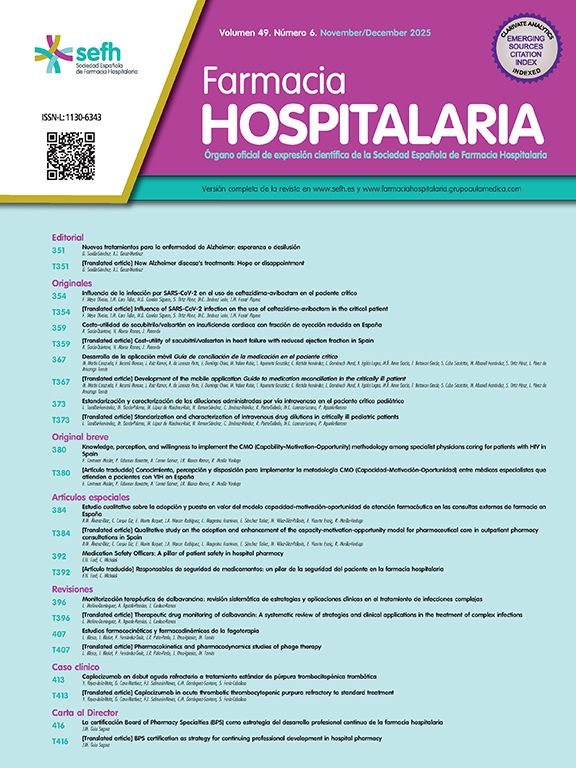Over the last decade there has been a significant increase in the number of clinical trials worldwide and this has opened up a range of new opportunities for those wishing to work in the research industry. The design, coordination and analysis of a clinical trial requires a multidisciplinary team which includes mainly the principal and sub-investigators, clinical research coordinators (CRC), research pharmacists, and clinical research associates (CRA), among others.1 The personnel involved in clinical research must be appropriately trained according to international guidelines. The International Conference on Harmonization (ICH) is a body that brings together the regulatory authorities of Europe, Japan, Canada and the United States to facilitate the mutual acceptance of clinical data based on Good Clinical Practice (GCP) guidance. This aims to ensure a quality standard for designing, conducting, recording, and reporting trials that involve human subjects.2 Additional requirements may vary in each country and be influenced by ethical backgrounds or local legislation.
The research pharmacist can play a fundamental role in the way clinical trials are conducted and contribute in different forms in the research process. The pharmacist can use his or her expertise and collaborate directly on pharmaceutical aspects such as drug composition and supervising indications, dosage, administration, contraindications, adverse effects and interactions of investigational drugs (IDs). In addition, pharmacists can help to ensure the safety of human subjects and their rights, which are mainly protected by local Institutional Review Boards (IRBs). For any of these functions, the pharmacist must be familiar with the research protocol, informed consent form, investigator's brochure, and standard operational procedures of the research centre which include regulatory, ethical, and legal requirements.
The accurate control of an ID may lead to the success or failure of a clinical study and the pharmacist is the most suitable team member for this task. It is the pharmacists’ role to ensure that the drug receipt is recorded in the study documents or in the interactive voice response system. The pharmacist also has the primary responsibility of drug dispensing.3 It is very common within clinical trials for patients to make mistakes with their prescribed medication and, in many cases, the pharmacist is the first to detect and report this. The pharmacist should only dispense an adequate amount of ID to each subject and this amount should cover dose requirements until the next collect visit. The patient should be made aware of the need to return all unused medication.
In order to ensure that the ID is in good condition for use, the pharmacist also has the duty to verify the drug product packaging and labelling, the drug substance analysis, pharmaceutical form, lot number, manufacturing and expiration dates, the correct use, handling and storing conditions, the drug administration routes and specific posology, and all dispensing, incinerating and handling procedures in the case of chemotherapy drugs. The pharmacist must ensure that the ID is stored according to the room conditions (temperature, light and humidity) determined by the sponsor. All data should be recorded on datasheets for future external audits. During receipt and shipment of IDs, the pharmacist should ensure that transport is performed according to the instructions specified by the sponsor. If there are any questions with regard to the quality or physical aspects of the ID, the pharmacist should not distribute the drug and must immediately contact the sponsor.4
It is very likely that that sort of oversight may arise during a number of these steps; therefore, the pharmacist in charge should be fully capable, committed and trained for that situation. Carelessness or lack of ability can cause serious problems for future development of ID. This is a growing area of interest to pharmaceutical companies and research centres worldwide and the search for competent and highly skilled professionals is rapidly growing.
Alternatively to specifically working as a pharmacist in a research project, a newly graduated or senior pharmacist may prefer to work as a CRC. The CRC has the role of assisting the investigator to comply with the research project requirements, aiming to obtain reliable trial results and to ensure the welfare of the subjects involved in the study.5,6 Moreover, data quality is essential to guarantee that study data is reliable and complete in order to accurately assess the safety and effectiveness of IDs. The accuracy of data entry is verified by a CRA who is also responsible for evaluating if the clinical study has been conducted according to the GCP/ICH and the applicable laws. All clinical studies require continuous data and safety monitoring, which is sent to the Data Management Committee for each sponsor. By monitoring visits the CRA is able to act as a link between the sponsor and the research centre.7,8 Additionally, pharmacists can be IRB members or Ad Hoc Consultants, the latter may be invited to become a guest reviewer for the Board by the IRB Chair to review special categories of research not covered by the expertise of regular members.
Currently, pharmacists are at the forefront of patient care and can have a significant impact on patient management. Moreover, the pharmacist may play a central role in the research process, which can influence directly the success of a clinical trial. However, in many countries, a graduated pharmacist may still have to struggle to find a job and, unfortunately, there remains a culture of not fully integrated into clinical research. In some cases it only occurs when the study sponsor is compelled by legislation to require the presence of a trained specialist. We hope to have emphasised in this short communication letter the growing role of the pharmacist in clinical research and their importance as skilled professionals in the scientific field. The increasing numbers of clinical trials also highlight that more trained personnel will be required and that pharmaceutical companies and research centres will need to appreciate the importance of this professional to a greater extent.





